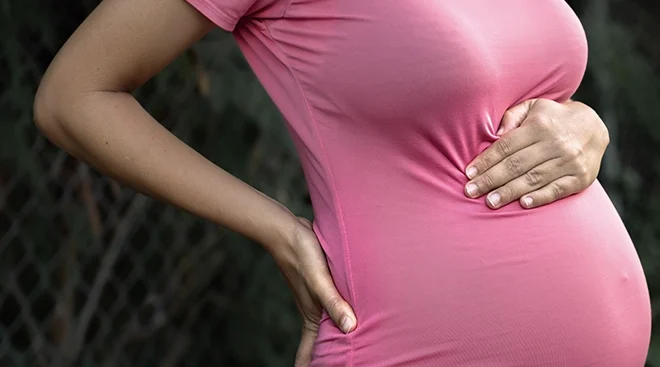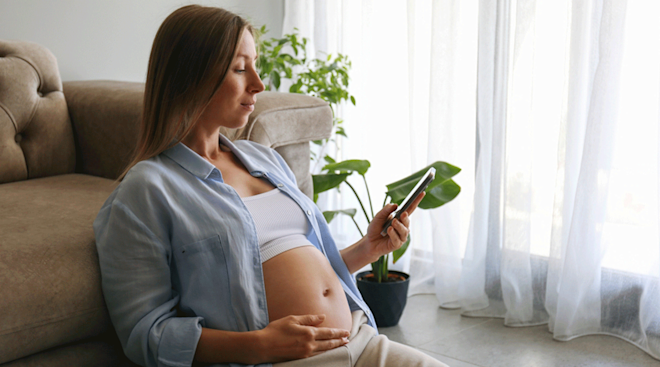What Might Be Causing Your Pelvic Pain During Pregnancy
The aches that come with pregnancy can be a pain in the butt—literally. They can also be a pain in the pelvis. According to the American Physical Therapy Association (APTA), roughly one in five pregnant people will experience pelvic pain while pregnant. It can originate in the groin region and radiate into your lower abdomen, stomach and/or perineum. In other words, it’s not particularly localized—and it can really put a cramp in your style.
Pregnancy pelvic pain is relatively common and normal, but that doesn’t mean you should have to suffer through it. Fortunately, there are steps you can take to reduce the discomfort. Read on for everything you need to know about experiencing pelvic pain during pregnancy—including what’s normal, what’s not and tips to help you cope.
Pregnancy pelvic pain can surface as sharp, shooting pangs that come out of nowhere, or as constant achiness and pressure, says Renita White, MD, an Atlanta-based ob-gyn. It can also happen when you change positions. And while the pain is localized in the pelvic area, it can emanate from slightly different spots:
Pelvic bone pain during pregnancy
“Pain in the pelvic bones is often caused by changes in the way the body moves and functions during pregnancy,” says Laura Giles, DPT, a physical therapist with Luna Physical Therapy. Experts chalk this up in part to pregnancy hormones, which can cause more movement in the joints and be perceived as pain in the actual bone.
Pelvic bone pain can radiate from the pubic symphysis (the joint right above your vulva), ischial tuberosities (the “sits” bones) or the sacrum/tailbone, Giles says—and, to complicate things, it usually involves some component of pelvic floor dysfunction. In other words, weak or tight pelvic floor muscles can cause excessive stress on the joint or change the way it functions.
Pelvic girdle pain during pregnancy
Pain that occurs when you use stairs, get in or out of the car, roll over in bed, stand on one leg, lunge or kneel are telltale signs of pelvic girdle pain, which can come on as a sudden jolt or persist as an ongoing discomfort, says Giles. Pelvic girdle pain—also referred to as pubic symphysis dysfunction—stems from the circle of bones that make up the pelvis at the base of the lower back, Giles explains. Weight gain, fluid shifts, uterus growth and loosened ligaments cause strain on the joints of the pelvis, ultimately contributing to pain in the girdle area, the sacrum and/or the front of the pubic bone, says White.
Pelvic floor pain during pregnancy
Also described as pain in the muscle of the pelvis, pelvic floor pain can lead to more pain in the perineum and behind and/or the sciatica and lower back, says White. Tension, pressure or discomfort associated with bathroom and bedroom activities are other hallmarks of pelvic floor pain during pregnancy—which typically stems from excess tension in the area due to tightness or overactivity as baby grows, Giles explains.
Pregnancy pelvic pain can kick in as early as the first trimester, but it becomes more common as you move toward your due date. Here’s what causes the aches and discomfort as your pregnancy progresses.
Pelvic pain in early pregnancy
In the first trimester, the stretching of the uterus can cause light cramping in the area, says White. Hormonal changes, constipation or changes in your activity level can also contribute to pelvic pain in early pregnancy, adds Giles. So many changes happen in the first trimester, and it can be difficult to distinguish one discomfort from another. “Any changes in your bowels or bladder, pain with intercourse, trouble with urination, incontinence or generalized pelvic pain are things that you want to look out for,” Giles says.
Pelvic pain in the second trimester
In the second trimester, the hormone relaxin increases the mobility and flexibility of your joints to make way for your growing baby. While this can make for great progress in prenatal yoga, it can also lead to additional discomfort in the joints and muscles, Giles says. What’s more, tension from strain on your pelvic floor muscles can lead to back pain or pelvic pressure, says White—particularly in response to sudden movements.
Meanwhile, your bump is expanding, and the body adapts by adjusting its spinal position, which can contribute to balance issues and joint strains in the front and back of the pelvis, says Karen Brandon, PT, DSc, a clinical specialist in women’s health physical therapy and spokesperson for the APTA. You’re working to keep yourself upright, and this translates to big changes in your posture, which can trigger pelvic pain and dysfunction, Giles adds.
Pelvic pain in the third trimester
Unfortunately, pelvic pain often worsens during the third trimester, when the weight of a growing uterus paired with separation of the pubic bones put additional pressure on the pelvis; this leads to more round ligament pain and sciatica discomfort, White says.
What’s more, as baby drops into the head-down position, they put more strain on your pelvic floor, which can increase pain in your lower back, sacrum, tailbone, sacroiliac joint and the pubic symphysis. “Complaints of pressure, heaviness, tension, dragging and soreness in your perineum often have to do with these muscles becoming tight and overworked,” Giles adds.
Postpartum pelvic pain
Sorry to say that even after baby has arrived, the pelvic pain may linger. “Many women don’t anticipate that there may be musculoskeletal discomforts that persist in the 12 weeks after delivery, which is now referred to as the fourth trimester,” Brandon explains. But the truth is that joint imbalances may continue after delivery. Adding potential insult to injury? New strains and weaknesses that may have occurred during delivery.
The good news? “Pain doesn’t have to be accepted as normal during the pregnancy or the postpartum period,” says Giles, who recommends seeing a pelvic floor physical therapist with prenatal experience to help eliminate pain and achieve some sense of normalcy during pregnancy. They can recommend stretches and exercises to strengthen surrounding muscles and take some pressure off the nerves and ligaments.
Other ways to mitigate the discomfort include:
- Using a sacroiliac belt or support
- Acupuncture
- Massage therapy
- Prenatal chiropractic care
- Using a warm heating pad or taking a warm bath
It’s also important to change positions slowly and maintain good posture. Sometimes, just taking a load off for a bit is all you need. “If you don’t get better with resting, it’s important to follow up with your OB provider to seek more care of this issue—or with a physical therapist who specializes in pelvic health assessment and treatment,” Brandon says.
It’s important to sleep on your side in the second half of pregnancy to ensure optimal blood flow. But you still want to make sure your spine is supported while you snooze, Brandon says. You may need to find a way to get your neck into a neutral position, or wedge a pillow or towel underneath your growing belly to prevent it from pulling you down and rotating your spine.
You’ll also want to make sure your top leg is supported from the hip joint to the ankle to prevent unnecessary strain and imbalance, Brandon says. A pregnancy pillow (or regular pillow) placed between the knees can be helpful for restlessness, pelvic pain, hip pain and lower back pain, Giles says.
Also, try to be mindful while moving around in bed. If you’re rolling over, squeeze a pillow between your knees. “It keeps your pelvis in a better alignment and can help get rid of that shocking pain,” Giles says.
White says that worsening or severe pelvic pain during pregnancy warrants a call to your doctor—particularly if it’s accompanied by bleeding, nausea, vomiting or painful urination. “You don’t have to wait until you get to the point where you are unable to walk without limping or cannot put weight on your leg due to pain in your groin, hip, buttock or back,” says Brandon.
That said, rest assured that if you’re experiencing pelvic pain, it’s generally par for the course and typically harmless to you and baby. It’s uncomfortable and inconvenient—but isn’t that true with most things in pregnancy?
Please note: The Bump and the materials and information it contains are not intended to, and do not constitute, medical or other health advice or diagnosis and should not be used as such. You should always consult with a qualified physician or health professional about your specific circumstances.
Plus, more from The Bump:
Renita White, MD, is an Atlanta-based ob-gyn and co-host of the podcast “Cradle & All.* She earned her medical degree from the Ohio State University.
Karen Brandon, PT, DSc, is a clinical specialist in women’s health physical therapy and spokesperson for the American Physical Therapy Association (APTA).
Laura Giles, DPT, is a physical therapist with Luna Physical Therapy.
American Physical Therapy Association, American Physical Therapy Association, 2023
Learn how we ensure the accuracy of our content through our editorial and medical review process.
Navigate forward to interact with the calendar and select a date. Press the question mark key to get the keyboard shortcuts for changing dates.





















































